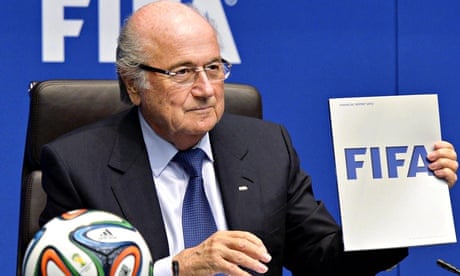Sepp Blatter has said it was a "mistake" to choose Qatar to host the 2022 World Cup, forcing Fifa to try to limit the damage.
"Yes, it was a mistake of course, but one makes lots of mistakes in life," said Blatter, Fifa's president, in an interview with the Swiss broadcaster RTS. "The technical report into Qatar said clearly it was too hot but the executive committee – with a large majority – decided all the same to play it in Qatar."
As ever, there is likely to be a political subtext to Blatter's comments, as he confirmed that he planned to stand again for another term as president in 2015.
Blatter is believed to have voted for the USA to host the 2022 World Cup while his prospective rival for the presidency, Uefa's Michel Platini, voted for Qatar and has been closely linked in the public mind with the controversial plans for the 2022 tournament.
The Fifa inspection team ranked Qatar as the only "high risk" option overall, yet it was still chosen by 14 of the 22 voting members of the executive committee in December 2010.
The Fifa president said it was now "probable" that it would be played in the winter rather than the summer due to the heat. Blatter insisted however that Qatar, which spent huge sums on ambassadors and development programmes, had not "bought" the World Cup.
Instead, he referred again to the "political considerations" that were brought to bear on the process. Platini and others have denied being influenced by their heads of state into voting for Qatar for business reasons.
"I will never say that they bought it, because it was political pushing. Really, both in France and Germany," said Blatter, who has previously claimed there was "definitely direct political influence" on European executive committee members to vote for Qatar.
France's foreign ministry said the assertion was "without foundation", despite the fact that Platini has admitted to attending a high level meeting with former president Nicolas Sarkozy and the now Qatari Emir.
Blatter also confirmed that he aimed to stay on as Fifa president. "Of course, I want to. Not just want to, I intend to continue," he said. Blatter, who has led Fifa since 1998, will be 79 when the election is held next May. His predecessor, the Brazilian João Havelange, was 82 when he stood down.
Blatter had previously insisted that this would be his final term, amid a continuing debate about whether the Fifa presidency should be subject to term limits.
The Swiss is expected to use next month's Fifa Congress in São Paulo to position himself for next year's election.
The only declared runner so far is the former Fifa executive Jérôme Champagne, although he has hinted that he will drop out of the race if Blatter formally declares his candidacy. Platini has said he will declare his hand after the World Cup.
Fifa rushed out a statement insisting that Blatter had not questioned Qatar's status as hosts.
"As explained in his answer to the journalist, the president reiterated that the decision to organise the World Cup in summer was an 'error' based on the technical assessment report of the bid, which had highlighted the extremely hot temperatures in summer in Qatar," it said. "At no stage did he question Qatar as the host of the 2022 Fifa World Cup."

Comments (…)
Sign in or create your Guardian account to join the discussion